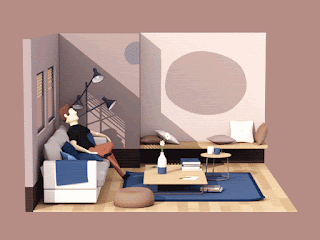A Better Place
Scene 1: A spacious room painted in a palette of bright colours. Warm light streaming from the open windows. Objects and furniture neatly arranged and accessible to all of your senses. Silence. All of your necessities placed within an arm's reach.
Scene 2: A cramped room with the shade of white asserting its touch upon every inch. A tubelight casting an overpowering glare whenever you look up. Furniture and foodstuffs strewn about haphazardly so that every step requires caution. Loud laughter and noise streaming from the hall. Just enough room to sit in.
Which do you think that you'll be happier and more likely to be productive in? Maybe it's subjective to some extent, but most of us would go with the first scene, and for a good reason.
Many of us familiar with the field of psychology tell ourselves that the external world and reality begins to matter less and less as we gain mastery over our perception and other domains of cognition, and we can train our mind to thrive in the exclusion of everything that is not innate or intrinsic and other such terms that predictably begin with 'in'.
But the fact of the matter is that where we find ourselves and who we surround ourselves with make more of an impact on our state of mind than we care to admit. The context effects by themselves affect our perception of the world and the train of thought that runs over its tracks. While most of us seem content with attributing our moods and academic scores on our surroundings without batting an eye, we neglect to make an active effort to make our immediate environment work for us instead. Our preferences may differ from person to person, but each of us can imagine an optimal space in mind that allows our mental health to thrive. Whether it has to do with the number of people around us, the ambiance, proximity of objects, clutter, or even where we choose to seat ourselves, our environment has a high level of influence on the activities that we partake in throughout the course of the day. We often complain that we lack self-control and look for ways to regulate our behaviour. On the other hand, we fail to keep in mind that our settings could be modified to naturally help us orient ourselves towards performing a given goal. If we don't influence them, we grant them permission to influence us, and most of us don't even know when this is happening. All the time.
Slumping on your sofa may cause you to scroll through your WhatsApp.
Idling alone near your bookshelf may cause you to flip through a few chapters of the book you always mean to read.
Sitting on your bed would cause you to relax and inclined to hit the pillows sooner or later.
Walking past the table may cause you to munch through your snacks for no particular reason.
Glancing at your work station just may cause you to review the assignment you need to turn in by midnight.
All of these add up at the end of the day when you introspect on the things you were able to take part in and finish. Being aware of your setting will always do you a solid, especially if you are on a schedule and struggling to juggle your leisure and work.
The friends around you are also important variables and guides of the activities that you may perform, which could go from watching Tumblr memes on Instagram, or banging your head when you're listening to something on their playlist. The takeaway here is that we can consciously choose to plan the variables and the structure of our environments when we wish to steer the direction of our day towards a certain course. Distractions may be rife on social media, your gang may want to pull you away from your plans, and you may feel that you lack the motivation for going through with what's on your checklist, but organising your space and choosing a given spot that is ideal for what you want to do is possibly the most effective step that you can take to increase the likelihood of getting at least a few items off the list.
You may often feel convinced that it's all in your head, but never underestimate the impact of the atmosphere to affect your mood and performance. If you feel that you can do better in a different spot, move. Let your instincts lead the way to your nest. If you're not in a good place mentally, well, move to a good place physically. Astoundingly simple? Yes. Effective? Also, yes.
- Nikhil



Totally agree based on experience. 👍
ReplyDelete